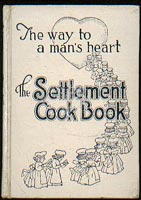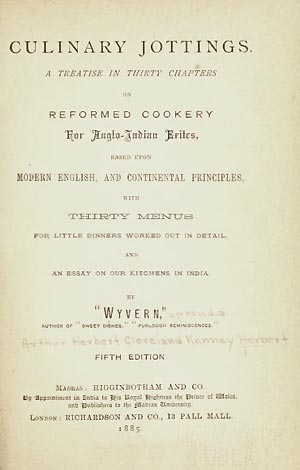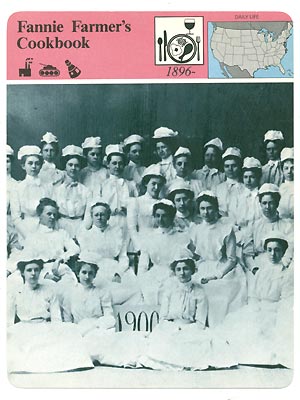Today, I revised and expanded the publishing history of the Joy of Cooking page on the store’s website.
Today, I revised and expanded the publishing history of the Joy of Cooking page on the store’s website.
Filed under 19th Century, 20th Century, Edition history, General, Influential
Read the article in Milwaukee Magazine: “Settlement Cookbook still dishes up warm memories by managing editor,” Bobby Tanzile.

Filed under 20th Century, Charitable, Influential, Jewish
Today I read an entertaining and informative post about the seminal book on the cuisine of British colonial India, Culinary Jottings for Madras by Wyvern (Col. A. Kenney Herbert).

While Col. Kenney-Herbert was stationed in British India he wrote articles for the Madras Atheneum and Daily News under the pen name, “Wyvern.” These articles formed the basis for Culinary Jottings.
According to Alan Davidson (1999),
The colonel believed in surrounding his recipes with historical material, etymological explanations, amusing anecdotes, and, above all, every detail that seemed relevant to him about the choice and purchase of ingredients as well as the preparation of the dish itself.
Besides being the best British colonial Indian cookery book, Culinary Jottings represents a budding genre of cookery writing.
Since I started selling cook books in 1989, I haven’t been lucky enough to come across a copy of Culinary Jottings except at the main branch of the Los Angeles Public Library.
A virtual copy of the fifth edition can be read at the Internet Archive. A reprint with a great introduction is available from Prospect Books.
Filed under 19th Century, Indian, Influential
Today, my Fannie Farmer’s Cookbook trading card arrived by post.
I’m nuts for cookbook-related ephemera like advertising, book reviews, brochures, etc.
The card, published in 1960, states that “over three million copies of Fannie Farmer’s Cookbook have been sold since its first appearance in 1896.”

Fannie Farmer’s Cookbook
A Revolution in Home Cooking (1896-?)
Over three million copies of Fannie Farmer’s Cookbook have been sold since its first appearance in 1896. In its way, this cookbook revolutionized home cooking. While it avoided difficult, exotic recipes, it boasted a unique feature: it taught cooking as a precise science. Recipes were printed with accurate, standardized measurements, so that each dish would emerge from the kitchen the same every time.
The author, Fannie Merritt Farmer, was born in Boston, Massachusetts, on March 23, 1857. A semi-invalid, she developed an interest in cooking and was sent by her parents to the Boston Cooking School for advanced training. After graduating in 1889, she became an assistant to the director and two years later she was named director. Meanwhile she had begun collecting and compiling recipes and cooking techniques from the school’s files and her own experience. These were published for the first time in 1896 under the title The Boston Cooking School Cook Book.
The book became an instant success. In the 19 years that passed before Fannie Farmer’s death in 1915, 21 editions were published. The first edition introduced the subject of “cookery, … the art of preparing food for the nourishment of the body,†and noted that
“progress in civilization has been accommpanied by progress in cookery.†That same cookbook, which has been reprinted, revised, and updated continuously since its original publication, still emphasizes accurate measurement.
In 1902 Fannie Farmer formed her own school, called Miss Farmer’s School of Cookery. The Boston Cooking School had been established to train teachers of cookery, but Farmer wanted to teach housewives how to cook. She also taught invalid cookery and gave lectures to nurses on the subject. She even taught her course on invalid cookery one year at the venerable Harvard Medical School. Farmer wrote many other cookbooks, including Food and Cookery for the Sick and Convalescent (1904), What to Have for Dinner (1905), and Catering for Special Occasions with Menus and Recipes (1911). Although shy and retiring, she was much in demand as a speaker. Even after being confined to a wheelchair by a stroke a few years before her death, she continued her work. She always hoped that her cookbooks, especially the still popular Boston Cooking School Cook Book, would “awaken an interest through its condensed scientific knowledge which will lead to deeper thought and broader study of what to eat.â€
Illustration: Fannie Farmer and her cooking class, 1900
© 1960, Panarizon Publishing Corp. USA
Photo Mass. HistoricaI Society
Printed in Italy 030125006
the text above is printed on on the reverse of the trading card
Filed under 19th Century, 20th Century, Influential